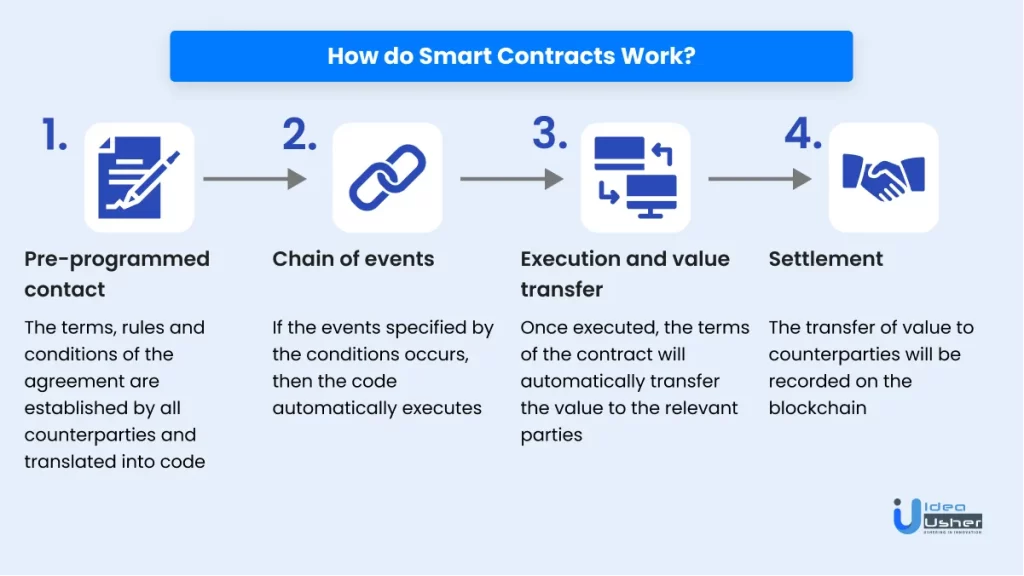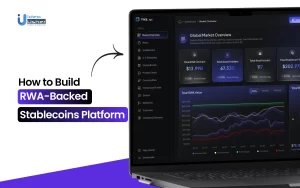Are you looking to perform a smart contract audit?
Smart contract auditing is the best way to ensure better security and performance of smart contracts. The audit is performed to discover errors, issues, and security vulnerabilities in the code and get them fixed.
But how to perform a smart contract audit? Let’s check.
What is a smart contract audit?
Before understanding auditing, let’s know what a smart contract is. Smart contracts trace the movement of things and intellectual property to facilitate and verify financial transactions.
As the smart contract involves financial transactions, there comes a necessity to focus on the security of the smart contracts.
The auditing examines the smart contract of a project to protect the money invested in them. There is no chance of funds recovery once the hacker withdraws from contracts because all the transactions on the blockchain are irreversible.
Therefore, the auditor examines the code within smart contracts, helping developers identify flaws and correct them to prevent any significant financial loss.
How do smart contracts work?
The following steps explain the working of smart contracts:

1. Predefined contract
The terms and conditions are agreed upon between the two parties and then uploaded in the smart contracts.
2. Chain of events
The events are variables in a smart contract that execute after meeting the conditions for triggering certain circumstances.
3. Value transfer
After the execution, the value, such as money or information, is transferred to the other partnered parties.
4. Settlement
The information and execution results of value transfer are saved as records on the specific blockchain that made a smart contract.
All the smart contracts need a particular P2P network to be embedded on a specific blockchain. The Ethereum network is a top priority of almost every smart contract developer because Ethereum has many miners worldwide, which makes Ethereum the world’s fastest and more secure blockchain network.
Let’s find out why a smart contract audit is necessary for business.
Why is the smart contract security audit important?
One of the most common problems with deploying smart contracts is security, and even more, minor coding errors can result in money theft from smart contracts in large quantities.
As a result, businesses are taking more care of their smart contract deployment due to its irreversible nature. Therefore, smart contact auditing becomes necessary for every blockchain contract deployment.
Let’s check how excellent smart contract auditing helps businesses to have a great experience with smart contracts:
1. Avoid costly errors
Auditing code in an earlier development life cycle helps you avoid fund loss after deployment, along with helping eliminate all of the flaws within the code.
2. Prevent security attacks
When writing codes or altering them, auditing helps to keep an eye on every security flaw that smart contract developers accidentally left.
3. Enhanced ownership
A smart contract security audit analyzes all the variables to help avoid its execution so only the smart contract owner can execute the contracts, not hackers.
4. Analytical reports
The auditor provides the overall summary of the smart contracts, which includes vulnerabilities and other weak points in the code, to help developers to fix them.
5. Expert review
The auditors manually check your code to find any potential security flaws in the smart contract. Also, they will help you improve them by giving suggestions and recommendations for that particular weakness and areas of improvement.
6. Continuous security assessment
The auditing process will help you check your smart contract’s weak areas regularly and will help to maintain its security from time to time. A regular security assessment will help you improve the performance and security of your smart contracts.
However, there are two ways to perform a smart contract audit that you must know.
How to perform smart contract audits?
The methods of applying smart contract audit vary from project to project.
Smart contracts auditing can be done either by manual approach or automatic approach, which have been discussed below:
1. Manual Auditing
The auditors and experts review each line of code to detect compilation and re-entry problems. Moreover, it also helps auditors to detect other security vulnerabilities like poor encryption practices.
The auditors do manual code analysis by reading the source code to find potential flaws.
2. Automatic Auditing
In automatic auditing, the code tester uses bug detection software which helps them to locate the point of source code responsible for generating errors. The software finds vulnerabilities much faster compared to manual editing.
However, the software is sometimes unable to find every vulnerability in the source code, which results in a greater potential risk of getting attacked by hackers.
Know how auditors perform smart contract auditing.
What are the processes of a smart contract audit?
These are steps for checking smart contract security that we have discussed below:
1. Collecting models of code design
Auditors collect the code specifications and examine their architecture to ensure guaranteed integration of third-party smart contracts. Collecting code specification and architecture help auditors understand the project’s goal and scope.
2. Run unit test
After collecting the models of court design, the auditors run the test cases for each smart contract. The auditing tools are manual or automatic, ensuring the unit test cases contain the overall smart contract code and don’t miss testing any part of the code.
3. Select the auditing approach
To improve the efficiency of smart contracts, auditors test the smart contract with either manual or automatic approach. However, manual auditing helps testers detect attacks like front running.
4. Preparing testing report
After completing the auditing, the auditors draft code flaws discovered during auditing and submit them to the developer teams for fixing each bug within the code.
5. Publish the final audit report
After smart contract developers fix the bugs, the auditor creates a final report that contains a record of all the issues and actions taken to fix all the issues within smart contracts.
But how do auditors validate smart contracts? Let’s check.
How do auditors validate the smart contracts?
The validation of smart contracts depends on their performance and security measures.
Therefore, along with checking security flaws, there should be testing on the performance of smart contracts. This includes finding any errors that slow down the execution of smart contracts.
Next, there should be testing for variables of the smart contract to improve its security as the smart contract contains a wide range of triggers that execute after meeting certain conditions.
Therefore each variable of smart contracts is tested multiple times to check whether each variable is resistant to manipulation or not, which the hackers perform.
Let’s check the security flaws that come when deploying smart contracts.
Critical vulnerabilities in smart contracts
You need to check all the standard security issues of smart contracts at the time of deploying the smart contract:
1. Timestamp dependency
There is a risk of manipulation in executing smart contracts by crypto miners. The manipulation happens whenever the smart contract logic is dependent on the current time for performing execution and meeting the predetermined goals.
2. Function visibility errors
Anyone can destroy the contract immediately if they access the function’s visibility of smart contracts. The chance of gaining access to functions visibility happens whenever developers forget to define the visibility of a private function.
3. Reentrancy attacks
Reentrancy attacks are another issue that happens when a function of smart contracts makes an external call to another untrusted contract. Reentrancy attacks occur whenever the smart contract developer has an uncaring attitude while developing smart contracts.
Along with Reentrancy attacks, there are many other popular types of attacks that happen on smart contracts, such as:
I. Over and underflows
Hackers get advantages in over and underflow situations due to not having the match between integer’s input and boundaries of integer variables. The situation can lead to hacking and other vulnerabilities when exploited.
II. Reordering attack
The hackers can change the packet order of the transmitted data without being detected in a particular blockchain for their benefit. Reordering in packet orders can result in multiple vulnerabilities that can put the security of smart contracts in danger.
II. Replay attack
The attack happens when hackers get access to a secure network and manage to resend/ delay a valid data transmission. Replay attacks help hackers to create duplicate transactions and take out money from the users’ accounts.
III. Short address attack
Whenever a contractor receives less data than expected, the solidity replaces the missing information bytes with zeros, resulting in severe issues for the businesses involved in that smart contract.
4. Manipulation of block hash function
The crypto miners can manipulate the block function and change the funds eligible for withdrawal for personal benefits. Determining manipulation is easy by knowing whether the use of block exists as a source of dependency for essential components of smart contracts.
5. Spelling mistakes
Sometimes the compilers cannot notice the spelling mistakes of the function’s spelling during programming, which results in the declaration of functions being declared public instead of private, allowing everyone to call that function.
Smart contracts use Solidity programming languages for their creation. There is a need for a Solidity compiler to compile the code written in solidity language.
6. Failure in differentiating humans and contracts
Sometimes the smart contracts cannot differentiate whether the smart contract itself or any person (hackers) performs the execution. Not having the perfect judgment ability of smart contracts helps hackers to steal money by manipulating the execution of smart contracts.
7. Incorrectly handled exceptions
There are many situations where solidity throws an exception. The smart contract can be vulnerable to attack from malicious users if there is no proper handling of these exceptions, which results in the rollback of the transaction involved within the execution of smart contracts.
However, there comes a classification of code errors that you must know:
- High potential impact
There is a high impact when smart contracts have a large user base and contain financial transactions.
- Medium potential impact
There is a medium impact of errors when the smart contract includes users’ information and financial transactions in less amount.
- Low potential impact
The risk is low if smart contacts contain the information of fewer users and don’t involve any financial transactions.
Every auditor submits audit reports to their clients and development teams, but what is an audit report? Let’s understand.
What is an audit report?
The report is a summary of the project, which contains the record of issues found within the smart contract. The problems can be related to security flaws, bugs, and areas of improvement within the code to help strengthen the security of a smart contract.
The audit report helps smart contract owners and developers discover the weak areas of their smart contracts and improve them by restructuring the code and other smart contract development practices.
Perform smart contract auditing with Idea Usher
Finding the best IT company for analyzing your smart contract is the best way to point out weak areas and improve them. A development team who has already worked on smart contracts and other blockchain-relevant projects can help you with smart contract auditing.
Contact Idea Usher for smart contracts auditing and improving the smart contract with our accurate auditing report. You can contact our team for a free consultation if you have other questions about your smart contracts.
Also, you can call us to create your blockchain projects starting from scratch.
Contact us:
Email:
Phone:
(+1)732 962 4560
(+91)859 140 7140
Build Better Solutions With Idea Usher
Professionals
Projects
FAQ
Q. How do you audit smart contracts?
A. You can follow the given below steps to audit the smart contract:
- Find out the specification and overall architecture of the project.
- Inform the client about the timer required for auditing based on the amount of work needed on smart contracts.
- Perform manual and automatic testing on the code of smart contacts to identify security flaws.
- Create a draft report, mention errors found within the code, and forward it to the project team for feedback and follow-up fixes.
- Prepare a final report with records of all the security flaws and how they get fixed.
Q. How long does a smart contract audit take?
A. On average, the smart contract auditing takes between two and 14 days depending on the factors such as the complexity of the project, smart contract size, and urgency. However, the audit may also take up to 1 month for massive projects.
Q. How much does it cost to audit a smart contract?
A. The cost of a smart contract depends on the project complexity, smart contract size, etc. However, the average cost of smart contract order can run into more than thousands of dollars, when large-size projects.
Q. Can a smart contract be hacked?
A. There is a chance of hacking smart contracts whenever security flaws exist on the blockchain of that specific smart contract. The hackers can identify security issues and steal money from users, and there is no chance of fund recovery due to the irreversible nature of the blockchain.
Q. How do you validate a smart contract?
A. Smart contract auditing helps validate smart contracts. The auditing process involves checking the smart contract code to identify security and performance flaws.

























